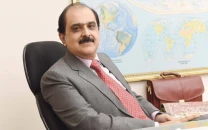Politicising the Council of Islamic Ideology

Earlier this week, the Women’s Action Forum insisted that Sherani, being a politician, could not be counted as an expert in Islamic jurisprudence and thus, was not qualified to head the body. Significantly, they also raised the concern that his new position would give him considerable leverage in Parliament as well.
The argument doesn’t seem to carry much weight if the constitutional definition of the CII is followed. Set up in 1962, the body had just an advisory role – it was to tell the legislature, when asked, about whether or not a law was repugnant to Islam. While it could also make recommendations to the Parliament about how to help Muslims live their lives in accordance with Islamic principles or even suggest Islamic injunctions, which could be translated into laws, significantly, the council did not have any teeth. The Parliament had the absolute authority to completely ignore the advice, if it so willed.
But, as Human Rights Commission of Pakistan chairperson I A Rehman argues, some moves have little to do with constitutional nuances and everything to do with realpolitick. “Admittedly, the CII was created to monitor the legislature but the appointment of conservative religious leaders from political parties will only give rise to further Islamisation and sectarianism,” he predicts.
“With a JUI-F leader as CII chairman, the party will use its powers to bring back Islamic voices to the Parliament and will also be keen to declare laws that suppress women and minorities,” contends Rehman. “And the last thing we can afford at this point is a more complicated interpretation of religion.”
Other activists also contest the utility of the CII itself. “No law in Pakistan is against Islamic injunctions; what is the point of having the CII and the Federal Shariat Court to ‘monitor’ legislation?” questions activist Nazish Brohi. “By doing so, we are just creating political space for the religious right, which is later co-opted by people such as General Zia to formulate discriminatory and repressive laws such as the Hudood ordinances and the qisas and diyat laws.”
Others point to more recent examples. As members of the Muttahida Majlis-e-Amal, the JUI-F had supported General Musharraf’s foreign policy. But equally significantly, the six-party religious alliance also managed to get the general to jettison any plans of repealing the Hudood ordinances.
The most problematic aspect of the religious right’s political ambitions is that they usually have no grounding in reality, argue some analysts. Were it not for the artificially created space, the Pakistan polity has historically rejected religious parties. At present, for example, the JUI-F has just six general seats and one reserved for women in the National Assembly, 14 seats in the Khyber-Pukhtunkhwa Assembly and two in the Punjab assembly.
There are also the subtle underpinnings of the political Islam framework, argue analysts. JUI-F chief Maulana Fazlur Rehman’s recent threat to walk out from the ruling coalition if the government did not consider the recommendations passed by the CII needs to be viewed in this light. “The point that a lot of people seem to have missed is that one of the main recommendations was a demand to review the country’s foreign policy in a pan-Islamic, anti-US context,” says a Karachi-based analyst.
Brohi also takes issue with the maulana’s academic credentials. “Members of the JUI-F cannot be regarded as experts on Islamic jurisprudence; the only reason the government agreed to appoint a chairman from their party was to appease them.” But a member of the JUI Sami-ul-Haq faction argues that Sherani is competent enough to run the CII as chairman. “He is an M.A. in Dars-e-Nizami and well-versed in Islamic jurisprudence as well,” says Mufti Usman Yar, the deputy general secretary of JUI-S. “If the government can overlook the incompetence and ‘educational background’ of ministers who are in the assembly with fake degrees, why can’t it ignore a political appointee in the CII?” he asks.
The stakes are just too high, answers Brohi. “We all know they are simply out there to impose their style of Islam and we do not approve of this.”
Published in the Express Tribune, June 18th, 2010.



















COMMENTS
Comments are moderated and generally will be posted if they are on-topic and not abusive.
For more information, please see our Comments FAQ